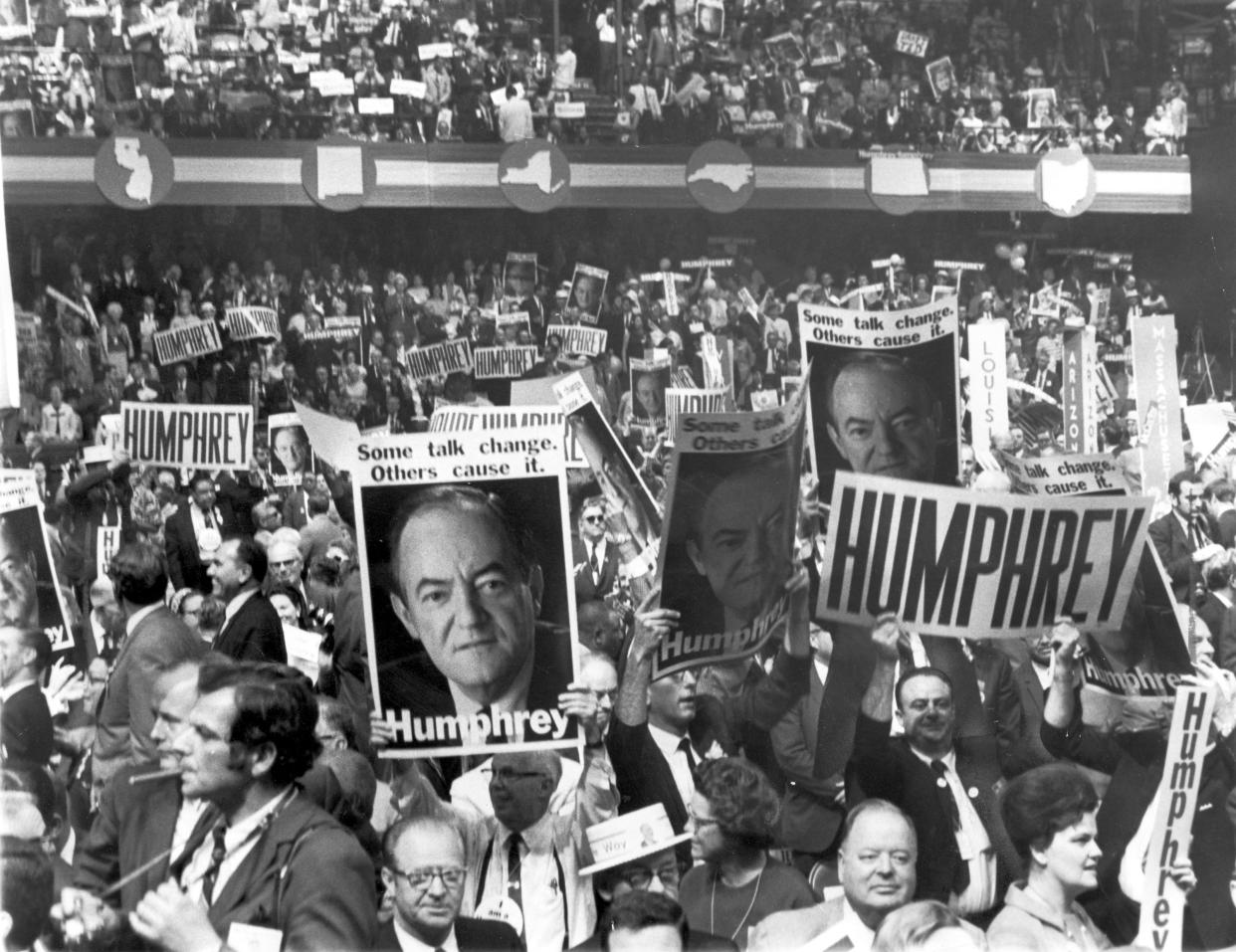Editorial: Biden is out, but Democrats still ought to let delegates vote on the Chicago convention floor

- Oops!Something went wrong.Please try again later.
Chicago has been the site of numerous memorable political conventions over the past 160-plus years, starting with the most famous and consequential of all — Abraham Lincoln’s improbable nomination as the Republican Party’s standard-bearer in 1860.
Lincoln famously won the prize on the third delegate vote after beginning the day well behind New York Gov. William Seward, who was the favorite. Franklin D. Roosevelt was nominated in Chicago during three of his four successful runs for the presidency. And, infamously, Chicago erupted in chaos in 1968, presaging Hubert Humphrey’s narrow loss to Richard M. Nixon.
So it continues to perturb us, now that Joe Biden has chosen not to stand for reelection, that the Democratic National Committee is still intent on a virtual delegate vote to nominate his all-but-certain replacement, Vice President Kamala Harris.
The party recently confirmed that delegate voting on a nominee would be completed by Aug. 7, via computer screens and Wi-Fi connections. The plan before Biden’s decision, of course, had been to conduct the early remote vote in what was an obvious ploy to lock in his nomination before opposition within the party could build enough to force him off the ticket.
This page said that was the wrong move — anti-democratic and self-defeating — when Biden was frantically seeking to cling to the nomination. The need for an open process that lasts until the convention, which opens Aug. 19, is obviously less urgent now that Harris has secured commitments from enough delegates to win the nomination.
But we still think the Democrats would do themselves, their presumptive nominee and the nation a favor if they conducted the delegate vote live and in person.
The party justifies remote voting, which first was conducted in 2020 for understandable pandemic reasons, due to concerns about attempts by Republicans to throw up legal roadblocks. That was the same rationale used to try to lock in Biden’s candidacy over the objections of well over half the Democratic electorate, at least according to polls. It wasn’t compelling then; it’s not compelling now.
Such a move would perhaps risk an odd delegate vote for, say, Marianne Williamson, or maybe a delegate or two unfurling a Palestinian flag or making a live statement departing from the party propaganda, but it would display supreme confidence in Harris and a free democratic process, all in the room where it happens.
It also would reinforce the helpful civics lesson the nation has gotten in recent weeks on how the major parties choose their presidential candidates. The withdrawal of Biden — unprecedented in terms of how late it occurred in the campaign — prompted some to wonder how a presumptive nominee who’d garnered votes for his delegates in every U.S. state could abruptly leave the stage and free his delegates to vote for whomever they choose. What would happen next?
He endorsed his vice president, and the rest of the party bigwigs fell in line with remarkable speed. But it easily could have been different.
Indeed, the infamous 1968 convention in Chicago might well have ended up brokered had Robert F. Kennedy lived. RFK entered the presidential contest very late in the process and just had won the crucial California primary when he was assassinated in Los Angeles. Momentum for his campaign at that point was undeniable, and it appeared before he was killed that no candidate would have enough delegates by the time of the Chicago convention to claim the nomination, which would have left it to the delegates and party leaders (such as Mayor Richard J. Daley) to determine the winner.
Had Biden withdrawn earlier, as Lyndon Johnson did in March 1968, we might well have seen a reprise in Chicago in 2024.
Democratic Party leaders no doubt are relieved to have the matter essentially settled before their printers say it’s too late to print those Harris-and-whomever T-shirts. But we would prefer a live reminder to the nation that convention delegates have the final say when chaos has erupted and previous plans have gone awry.
Submit a letter, of no more than 400 words, to the editor here or email letters@chicagotribune.com.

